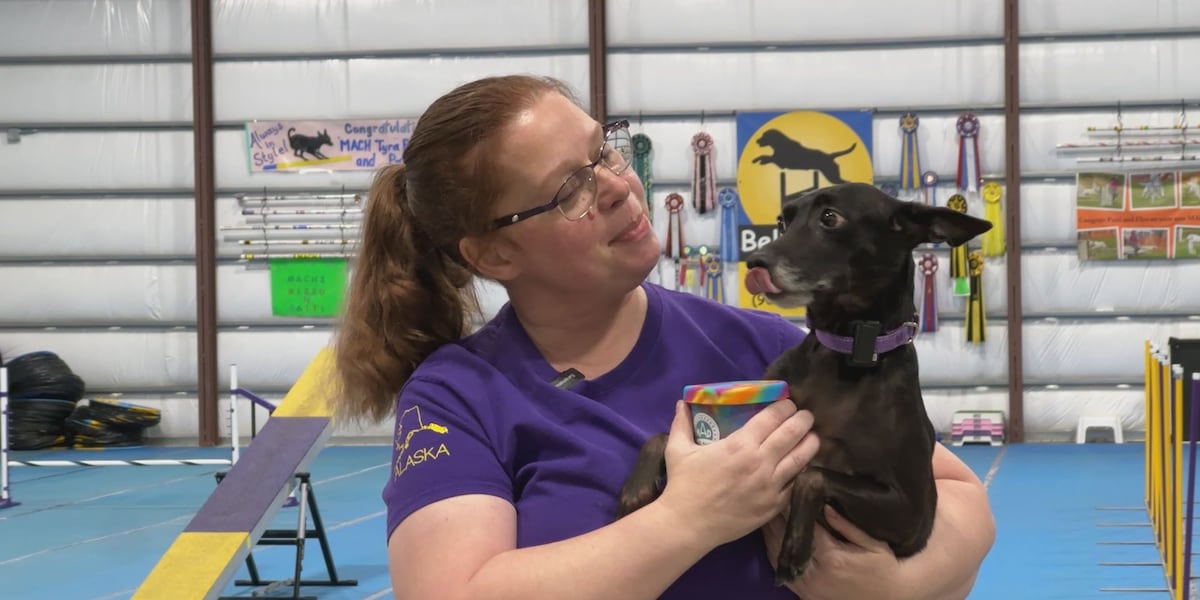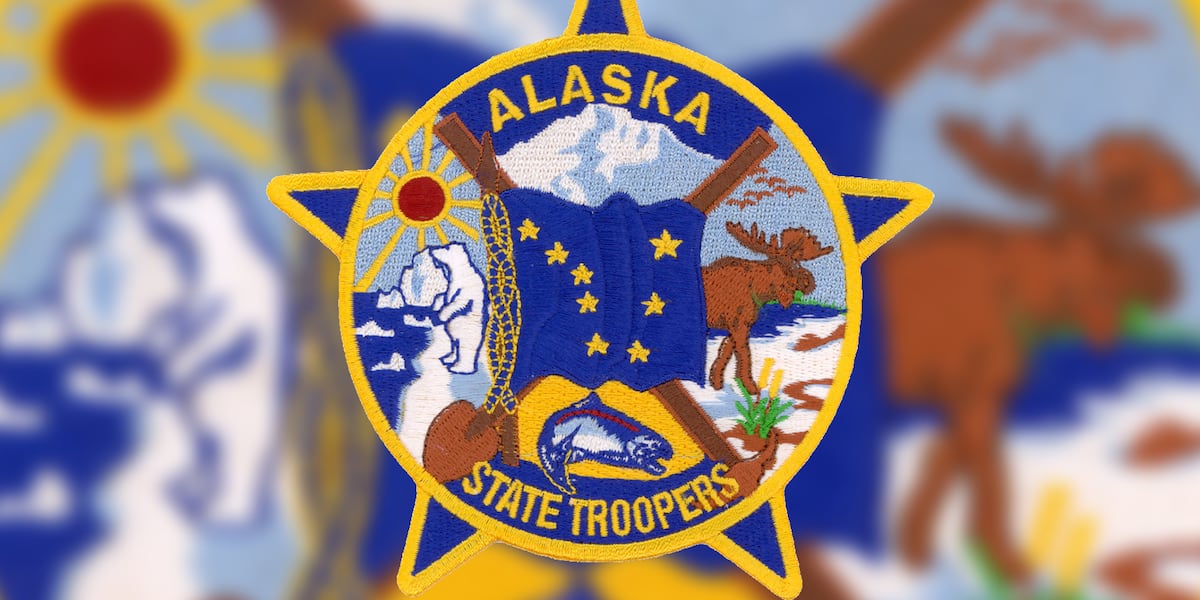Alaska
Alaska dive team refocuses efforts after troopers suspend search for Amanda Richmond Rogers

PALMER, Alaska (KTUU) – Inside the Silver Sky Aviation hangar at the Palmer Airport, AK Dive Search Rescue & Recover Team members Jeremy Lilly and Austin Bulawa work to empty a trailer they recently obtained. They’re stripping it down before it gets insulated with spray foam. The trailer will be used to store and haul equipment, as well as act as a warm environment to change out of wet gear.
It’s only been one day since Alaska State Troopers suspended the search for missing Eagle River woman Amanda Richmond Rogers, who fell under the ice of the river attempting to save her dog.
“It’s very hard when we don’t find someone,” Lilly said. “It’s always the thing in the back of your mind. It’s like – well what if I looked here, what if I did this.”
When Lilly founded the organization in 2016, he said he knew it wasn’t going to be easy, that much of the team’s work would be centered around recovery as opposed to rescue, and that efforts to locate a victim weren’t always going to be successful.
“Recovery, if we can do it, is the greatest thing in the world to the family because they actually know what happened, they have closure, they have someone there that they can recognize,” Lilly said. “Whereas if there’s no closure it’s like, ‘OK where are they?’ We didn’t bring them home. That kind of thing. So, that’s the challenge that comes from it.”
Despite the heartbreak that comes with not being able to recover the body of a missing loved one, the dive team continues to support search efforts in partnership with AST throughout the state and uses areas where previous searches have gone cold for training. For them, it’s an opportunity to keep looking.
The nonprofit organization also focuses on community outreach and water safety education to help prevent incidents from happening in the first place.
The nonprofit is mostly funded through public donations, and is 100% volunteer-based, organizers said. Every member pays for their own equipment, uses their personal dry gear in the field, and funds their own training, Lilly said, and it is costly.
Bulawa, who met Lilly during a training course in 2021 and is now the vice president of the organization, said he’s probably lost tens of thousands of dollars in missed work hours to go on missions.
“Ultimately, [that] does not matter to me,” Bulawa said. “It brings the ability to give closure to somebody, takes away the unknown.”
Bulawa said he’s grateful to do the work, especially in a state with bodies of water that many people use for subsistence, transportation and recreation.
Alaska’s harsh conditions take a toll on the team’s equipment. During the search for Richmond Rogers, the dive volunteers worked in sub-zero temperatures which led to a cable breaking on their sector scan sonar rendering it inoperable and in need of repair.
According to Lilly, the Department of Public Safety reimburses third-party rescue teams for things like lodging and food – but equipment repair is not a guarantee.
“It’s basically up to their discretion, but usually that’s not a problem,” Lilly said.
The problem, sometimes, is finding the funds to pay those initial costs upfront. The majority of public donations, the nonprofit receives, come from the family members of those the team has actively searched for, Lilly said.
“A lot of the families of those we’ve looked for or recovered are our biggest supporters across the board, whether we brought someone home or not, just because of the period of time we spent searching,” Lilly said.
Lilly said he insists families keep their money, but said a lot of times they won’t take no for an answer.
Such was the case for the family of Richmond Rogers, who have asked that a memorial fund be set up for people to donate to the organization as a way to honor Amanda and support the dive team’s efforts in trying to locate her.
Despite the emotional burden of such heavy volunteer work, and the stress of the financial struggles that go along with operating a nonprofit organization, both Lilly and Bulawa agree that it’s a toll worth paying – to be able to offer grieving families the closure they need.
“By performing these kinds of missions, even though they’re recoveries, the important thing is the closure,” Lilly said. “A lot of ways it gives us the closure as well as to the families.”
Copyright 2023 KTUU. All rights reserved.

Alaska
Homer welcomes back Kristen Faulkner months after accomplishing Olympic history in Paris

HOMER, Alaska (KTUU) – As Kristen Faulkner walked the stage of the Homer Theater, a few memories came to mind.
“I walked on stage just now in preparation for the event and I have all these memories flooding of being a little mouse in the Nutcracker, a young Clara, and playing piano in Jubilee,” Faulkner said.
Within the halls of Homer High School, Faulkner prepared for another public speaking event. One of many the Alaskan had been the lead in following the 2024 Olympic Games. Only she wouldn’t be speaking to a group of strangers.
This time, she was back in Alaska. Faulkner’s first time in the Halibut capital of the world in well over a year.
“We’ve been looking forward to this since Paris,” Former Mayor of Homer Ken Castner said.
“It’s heartwarming to have her home,” her mother Sara Faulkner said.
Arriving back in the 49th state earlier this week, Friday was one of the first moments the cyclist had spent in town since making Olympic history. Faulkner became one of the highlights for Team USA after winning two gold medals in Paris, including the first for the nation in the women’s road race in 40 years. Faulkner also competed in the women’s Tour De France shortly after, placing 38th overall.
“There’s moments where it sinks in and I’m like ‘wow, I did something really cool,’ she said. “The more I do events like this and come back home and take it in with my friends and family, that’s where it feels a lot more real.”
“It was funny with her siblings because growing up, she was always Katie’s sister or Andrew’s,” Sara Faulkner said. “Now, they’re all Kristen’s sister or brother.”
Now, months removed from those feats, Faulkner’s focus has shifted to helping encourage those back home. An impact felt across the community.
“She’s touched every aspect of our community,” Representative Sarah Vance said. “She just exudes everything Homer is proud of. We focus a lot on empowering our kids and encouraging them to be wonderful and do great things. She is that.”
“I think the biggest thing is to dream really big and never stop believing in yourself,” Faulkner said. “We often sell ourselves short and I think the sky’s the limit if you work hard and believe in yourself.”
Though she hasn’t had the opportunity to return to the trails due to weather, Faulkner says she plans to ride the roads once again when she returns on her next trip. The same twists and turns that helped her grow into the now-renowned cyclist she is today. But those accomplishments haven’t made her complacent as Faulkner says her mind is already on to the next mission.
“I definitely want to try to make the 2028 Olympics, that’s my next big goal,” she said. “Between then, I wanna win a stage of the Tour De France, I wanna maybe go for a world championship at one of the events. I definitely have some big goals.”
But no matter where the competition is; whether it’s Spain, France, or state side in the 2028 LA Games, Faulkner’s ties will always remain in the Last Frontier. A state she’s happy to represent.
“I hope people see that I’m an Alaskan,” Faulkner said. “I hope people see someone that has a rugged, independent spirit and who loves the outdoors.”
See a spelling or grammar error? Report it to web@ktuu.com
Copyright 2024 KTUU. All rights reserved.
Alaska
Tyra Banks, Alaska canine superstar, is fastest on 4 legs

ANCHORAGE, Alaska (KTUU) – Her full name is Spring Wind’s Dressed to Impress at Bell Creek, but owner Patti Engleman calls her agility dog the name of her favorite supermodel, Tyra Banks.
The 7-year-old canine isn’t known so much for her good looks but rather for her speed. She’s a Xoloitzcuintli, a Mexican breed that is usually born hairless, but this one is a Xolo with a sleek, glossy coat.
“They are actually one of the oldest breeds in the world, if not the oldest. There’s debate on that,” Engleman said, adding that Xolos were favorites of the Aztecs.
“So you guys used to be sacrificed on special occasions,” she said looking at Tyra. “That’s why they say she’s so fast — it’s survival of the fittest.”
And Tyra is fast. For the last four years, she’s been the number one Xolo for agility in the country, according to the American Kennel Club.
In mid-December, she earned another title. Engleman was invited to bring Tyra to the AKC Agility Invitational in Orlando, Florida. She finished the course in 29.597 seconds, winning the 12-inch height division, something Engleman said was a first for her breed.
The win was made more special, Engleman said, because Tyra has a condition known as Cushing’s Disease, which could end her career at any time.
Engleman said making it to invitationals was on her bucket list for Tyra.
“Invitationals was one thing I really wanted to accomplish with her in her lifetime … and we made finals, and we won,” Engleman said. “I didn’t expect to win, it was beyond what my goal was for her, because honestly, she’s incredible. I know I’m really lucky to have this dog.”
Engleman said Tyra can lead a full life with treatment, but as long as her agility days are uncertain, she isn’t taking their time as competitors for granted.
“It’s okay, we are going to manage it, and we are going to keep having fun but that’s part of the reason I’m trying to enjoy as much time as I can with her,” she said.
See a spelling or grammar error? Report it to web@ktuu.com
Copyright 2024 KTUU. All rights reserved.
Alaska
Alaska Man Reported Someone for AI CSAM, Then Got Arrested for the Same Thing

If you are going to contact the police and rat on someone for expressing their interest in child sexual abuse material (CSAM) to you, maybe it is not the best idea to have the same material on your own devices. Or to further consent to a search so law enforcement can gather more information. But that is allegedly what one Alaska man did. It landed him in police custody.
404 Media reported earlier this week on the man, Anthaney O’Connor, who ended up getting himself arrested after a police search of his devices allegedly revealed AI-generated child sexual abuse material (CSAM).
From 404:
According to newly filed charging documents, Anthaney O’Connor, reached out to law enforcement in August to alert them to an unidentified airman who shared child sexual abuse (CSAM) material with O’Connor. While investigating the crime, and with O’Connor’s consent, federal authorities searched his phone for additional information. A review of the electronics revealed that O’Connor allegedly offered to make virtual reality CSAM for the airman, according to the criminal complaint.
According to police, the unidentified airman shared with O’Connor an image he took of a child in a grocery store, and the two discussed how they could superimpose the minor into an explicit virtual reality world.
Law enforcement claims to have found at least six explicit, AI-generated CSAM images on O’Connor’s devices, which he said had been intentionally downloaded, along with several “real” ones that had been unintentionally mixed in. Through a search of O’Connor’s home, law enforcement uncovered a computer along with multiple hard drives hidden in a vent of the home; a review of the computer allegedly revealed a 41-second video of child rape.
In an interview with authorities, O’Connor said he regularly reported CSAM to internet service providers “but still was sexually gratified from the images and videos.” It is unclear why he decided to report the airman to law enforcement. Maybe he had a guilty conscience or maybe he truly believed his AI CSAM didn’t break the law.
AI image generators are typically trained using real photos; meaning pictures of children “generated” by AI are fundamentally based on real images. There is no way to separate the two. AI-based CSAM is not a victimless crime in that sense.
The first such arrest of someone for possessing AI-generated CSAM occurred just back in May when the FBI arrested a man for using Stable Diffusion to create “thousands of realistic images of prepubescent minors.”
Proponents of AI will say that it has always been possible to create explicit images of minors using Photoshop, but AI tools make it exponentially easier for anyone to do it. A recent report found that one in six Congresswomen have been targeted by AI-generated deepfake porn. Many products have guardrails to prevent the worst uses, similar to the way that printers do not allow photocopying of currency. Implementing hurdles at least prevents some of this behavior.
-
/cdn.vox-cdn.com/uploads/chorus_asset/file/24924653/236780_Google_AntiTrust_Trial_Custom_Art_CVirginia__0003_1.png)
/cdn.vox-cdn.com/uploads/chorus_asset/file/24924653/236780_Google_AntiTrust_Trial_Custom_Art_CVirginia__0003_1.png) Technology1 week ago
Technology1 week agoGoogle’s counteroffer to the government trying to break it up is unbundling Android apps
-

 News1 week ago
News1 week agoNovo Nordisk shares tumble as weight-loss drug trial data disappoints
-

 Politics1 week ago
Politics1 week agoIllegal immigrant sexually abused child in the U.S. after being removed from the country five times
-

 Entertainment1 week ago
Entertainment1 week ago'It's a little holiday gift': Inside the Weeknd's free Santa Monica show for his biggest fans
-

 Lifestyle1 week ago
Lifestyle1 week agoThink you can't dance? Get up and try these tips in our comic. We dare you!
-
/cdn.vox-cdn.com/uploads/chorus_asset/file/25672934/Metaphor_Key_Art_Horizontal.png)
/cdn.vox-cdn.com/uploads/chorus_asset/file/25672934/Metaphor_Key_Art_Horizontal.png) Technology4 days ago
Technology4 days agoThere’s a reason Metaphor: ReFantanzio’s battle music sounds as cool as it does
-

 Technology1 week ago
Technology1 week agoFox News AI Newsletter: OpenAI responds to Elon Musk's lawsuit
-

 News5 days ago
News5 days agoFrance’s new premier selects Eric Lombard as finance minister
:quality(70)/cloudfront-us-east-1.images.arcpublishing.com/adn/VERLIMMW2VDANMX4A73IG4I7KM.JPG)


:quality(70)/cloudfront-us-east-1.images.arcpublishing.com/cmg/Q2LRKTPGURDUDKECXVHX37U53A.jpg)
/cloudfront-us-east-1.images.arcpublishing.com/gray/6L3YECSFMFCWVICYBAOYZIV4IQ.jpg)














